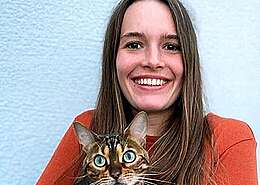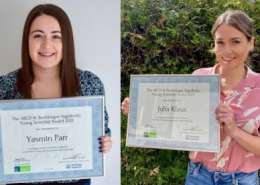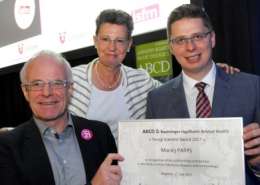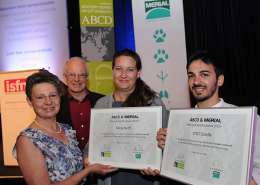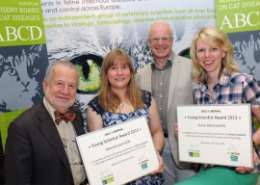2013 Young Scientist Award Winners Deborah Gow and Sanne Dolieslager

Deborah Gow: investigating feline immunity
The 2013 AMYSA for Basic Research was presented to Deborah (Debbie) Gow, a PhD student at the Roslin Institute, University of Edinburgh (UK), for her work on the feline colony stimulating factor (CSF-1) and its receptor, CSF-1R.
Deborah’s work demonstrated that feline macrophages can be produced and maintained in culture, by using either blood or bone marrow cells and a range of species macrophage stimulating factors. “This finding is essential for further research into specific feline macrophage disease processes – and the cells can also be cryopreserved for use at a later stage,” she explained. Furthermore, as CSF-1 has shown to induce renal repair in mice models, it contributes to further work into renal failure in cats.
“The jury based its decision on the submitted material, but also on past performance in research, the number and quality of the supporting publications and the respective journal impact factors, explained professor Marian C. Horzinek, chairman of the European Board on Cats Diseases (ABCD). “The winning study was well-structured and indicated possible applications.” He also lauded the sheer amount of work and the experimental sophistication.
Sanne Dolieslager: factors of feline chronic gingivostomatitis
The 2013 AMYSA for Clinical Research went to Sanne Dolieslager, a veterinary surgeon from the Netherlands, who completed her PhD on the aetiopathogenesis of feline gingivostomatitis at the University of Glasgow (UK).
Feline chronic gingivostomatitis (FCGS) is a severe inflammatory disease of the feline oral cavity that causes pain and distress and may even lead to euthanasia of affected cats. Sanne’s study was based on the multifactorial aspects of the disease, including bacteriology (molecular microbiology, culture), viral status of the cats and the patient’s immune response to infection (TLR and cytokine gene expression).
“Conclusions of her work will be highly appreciated by general practitioners, commented Albert Lloret, jury member, ABCD vice president and lecturer at the Veterinary Teaching Hospital, of the Universitat Autónoma de Barcelona (Spain).
ABCD & Merial Young Scientist Awards
The awards were presented in Barcelona by Professor Marian C. Horzinek (ABCD), and Dr Jean-Christophe Thibault, Merial’s Technical Director for Biologicals (Europe, Middle East and Africa).
The ABCD and Merial Young Scientist Award, created in 2008, is funded by Merial and is presented to a young scientist in veterinary or biomedical sciences, who has made an original contribution in the field of feline infectious diseases and/or immunology. Applicants should have published their findings in a journal listed in PubMed or Web of Science or have had them accepted by another recognised assessing body.
Candidates should be based in Europe, have completed a veterinary or biomedical curriculum, and be under 35 years of age at the time of application. Applications in the fields of both basic and applied sciences are welcome.

July 2013 – Two ABCD & Merial Young Scientist Awards (AMYSA) were presented this year, for Basic research and for Clinical research. The award ceremonies took place on 30 June in Barcelona, at the occasion of the congress of the International Society of Feline Medicine, organised by International Cat Care.
